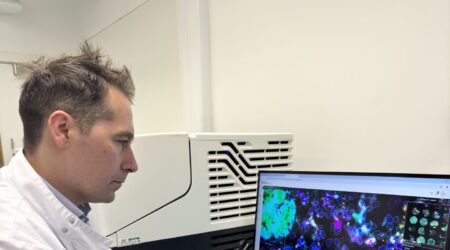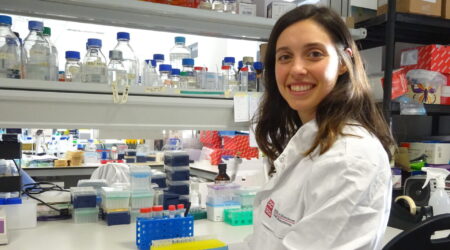Lead researcher: Professor Nigel Jamieson
Location: University of Glasgow
Date: Spring 2024
Project status: Ongoing
How do pancreatic cysts develop into pancreatic cancer?
The challenge
Pancreatic cysts are saclike pockets of fluid inside or on the pancreas. They are common, with around 20% of people over the age of 60 estimated to have a pancreatic cyst, and are that are often found during scans of the abdomen that are carried out for other reasons. In most cases pancreatic cysts are benign, however around 10-15% will eventually develop into pancreatic cancer.
Once a cyst has been identified, it is currently very difficult for doctors to know how to manage them. If they do nothing, there is a chance that the cyst could develop into pancreatic cancer. However, removing the cyst via surgery is a major operation that comes with a significant risk of complications, including death. As a result, the current management of pancreatic cysts is a somewhat controversial topic amongst specialists and the approach varies considerably between different hospitals.
There is an urgent need to improve our understanding of how pre-cancerous pancreatic cysts develop into cancer. It would be of great benefit to both patients and clinicians if we could identify which cysts are most likely to become cancerous and should be removed and which could be safely left.
Finding out that they have a pancreatic cyst can be very worrying for patients. The concept of this project originated directly from the concerns of patients attending a pancreatic cyst surveillance clinic in Glasgow, who described the anxiety of living with a “time bomb in their pancreas”.
The project
Professor Jamieson will carry out the first highly detailed study of pancreatic cysts to better understand what causes them to develop into cancer.
Using cutting-edge imaging and analysis tools known as “spatial analysis”, the team will study over 550 patient cyst tissue samples to produce a detailed map of how the cells are arranged in the cysts and how they communicate with each-other. They will also use an experimental model of pancreatic cancer to explore how cysts develop into pancreatic cancer over time.
The information that the researchers gather will be used to generate a computer model which simulates how pancreatic cysts develop into pancreatic cancer and will help to identify features of pancreatic cysts that are high-risk and therefore most likely to develop into pancreatic cancer.
The hope
Improving our understanding of how pancreatic cysts develop into pancreatic cancer will help doctors to make treatment decisions and improve the management of people with pancreatic cysts.
High risk patients could be closely monitored and offered life-saving surgery at the first opportunity, whereas those with cysts unlikely to develop into cancer could be reassured. A consistent approach to managing pancreatic cysts also has the potential to save the NHS time and money.
We are honoured to receive funding to advance our research into pancreatic pre-malignant cysts using state-of-the-art spatial biology technologies. This award provides an invaluable opportunity to explore the early biological changes in pancreatic cancer, potentially paving the way for earlier diagnosis and improved patient outcomes.




